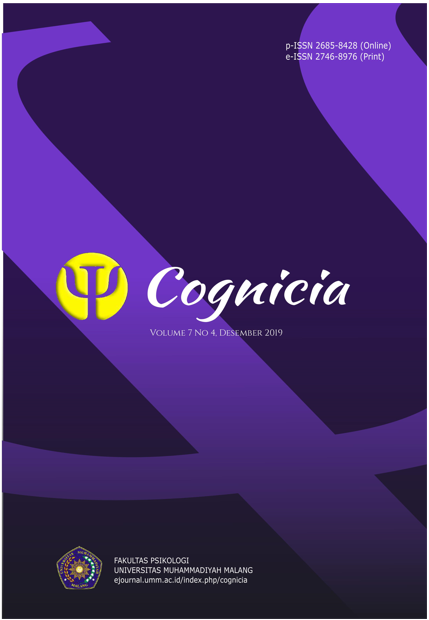Hubungan dukungan sosial keluarga dengan psychological well-being pada narapidana anak di Lapas Kelas 1 Kutoarjo
DOI:
https://doi.org/10.22219/cognicia.v7i4.10218Keywords:
psikologi, dukungan sosial keluarga, kesejahteraan psikologis, narapidana anakAbstract
The research aims to knowing the relationship between social support and psychological well-being in child prisoner. This research is designed by using sampling saturated technique with 53 participants. Variable of family social support using Cutrona’s theory (1987) which consist of 24 items and psychological well-being variable using Ryff’s theory (1989) which consists of 42 items. The research method in data collecyion using scale method. That is the scale of family social support and the Ryff’s psychological well-being scale. Data analysis using the product moment correlation analysis techniques and obtained a comparison coefficient of 0,688 with a sig value.= 0,000 (p< 0,001). Based on the research result shows a positive relationship between family social support and psychological well-being on child prisoner in prison in kutoarjo.Downloads
References
Amawidyati, S. A. G.& Utami, M. S. (2007). Religiusitas dan psychological well being pada korban gempa. Jurnal Psikologi Universitas Gajah Mada, 34, 164-176. DOI: 10.22146/jpsi.7095
Azwar, S. 2004. Validitas dan reliabilitas. Yogyakarta: Pustaka Pelajar.
Cutrona, C. E, et. Al. (1994). Peceived parental social support and academic achievement : an attachment theory perspective. Journal of Personality and Social Psychology. 66(2), 369-378
Johnson, D. W. & Jhonson, F.P. (1991). Joining Together: Group Theory and Group Skills. Fourth Edition. London: Prentice Hall International
Kartono, K. (2014). Patologi sosial. Jakarta: Rajawali.
Keyes, C. L. M., & Waterman, M. B. (2003). Dimensions of Well-Being and Mental Health In Adulthood-En M. Bornstein, L. Davidson, CLM Keyes y K. Moore (eds.), Well-being: Positive Development Throughout the Life Course (pp. 447-497).
Lubis, S.M., & Maslihah, S. (2012). Analisis sumber-sumber kebermaknaan hidup narapidana yang menjalani hukuman seumur hidup. Jurnal Psikologi Universitas Diponegoro,11(1), 28-39.
Millatina, A. dan Yanuvianti, M. 2015. Hubungan antara Dukungan Sosial dengan Psyhological Well-Being pada Wanita Menaupose (di RS Harapan Bunda Bandung). http://karyailmiah.unisba.ac.id/index.php/psikologi/article/view/1250
Ryff, C. D. (1989). Happines is everything, or is it? Explorations on the meaning of Psychological Well-Being. Journal of personality and Social Psychology, 57, 1069-1081. DOI: 10.1037/0022-3514.57.6.1069
Ryff, C. D., & Keyes, C. L. (1995). The structure of psychological well-being revisited. Journal of Personality and Social Psychology, 69, 719-727. DOI: 10.1037/0022-3514.09.4.719
Ryff, C. D., & Singer, B. H. (2006). Best news yet on the six-factor model of well-being. Social Science Research, 35(4), 1103-1119.
Sari, D., & Suprapti, V. (2013). Pengaruh dukungan sosial keluarga terhadap Psychological well-being pada masa pensiun. Jurnal Psikologi Pendidikan Dan Perkembangan 2
Sarafino,E.P. (1998). Health Psychology : Biopsychososial Interactions. Third
Edition. United States of American : John Wiley & Sons. Inc
Soetjiningsih, Christiana Hari. (2012). Perkembangan Anak sejak Pembuahan sampai denganAnak-anak Akhir. Jakarta: Prenada Media Group
Yasin, Safree, A., & Dzulkifli, M. A., (2010). The relationship between social support and psychological problems among students.
Downloads
Published
How to Cite
Issue
Section
License
Copyright (c) 2019 Yehezkiel Adi Nugroho

This work is licensed under a Creative Commons Attribution-ShareAlike 4.0 International License.
Authors who publish with Jurnal Cognicia agree to the following terms:
- For all articles published in Jurnal Cognicia, copyright is retained by the authors. Authors give permission to the publisher to announce the work with conditions. When the manuscript is accepted for publication, the authors agree to automatic transfer of the publishing right to the publisher.
- Authors retain copyright and grant the journal right of first publication with the work simultaneously licensed under a Creative Commons Attribution-ShareAlike 4.0 International License that allows others to share the work with an acknowledgment of the work's authorship and initial publication in this journal.
- Authors are able to enter into separate, additional contractual arrangements for the non-exclusive distribution of the journal's published version of the work (e.g., post it to an institutional repository or publish it in a book), with an acknowledgment of its initial publication in this journal.
- Authors are permitted and encouraged to post their work online (e.g., in institutional repositories or on their website) prior to and during the submission process, as it can lead to productive exchanges, as well as earlier and greater citation of published wor (See The Effect of Open Access).

This work is licensed under a Creative Commons Attribution-ShareAlike 4.0 International License







